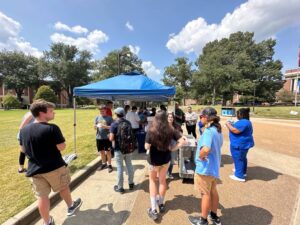As one semester ends and we prepare to start another, it is important to do so with gratitude for what God has done and a heart of expectation for the semester ahead. As we look to the upcoming semester, one of the key areas we must consistently address and focus on is the development of our student leaders. Whether your leaders are continuing on in a serving capacity for another semester, or if you are bringing on new leaders mid-year, as leaders of leaders we must invest and focus our leaders on preparing for how God might use them in the days ahead. Here is a simplified list of five things I value when preparing my leaders for another semester:
1. A Fresh Encouragement of the Gospel
Encouragement is often under-valued, and while we should be consistently encouraging student leaders, we must focus on encouraging leaders in the Gospel. It is easy for all us to drift away from our true connection to God and begin operating in our flesh. We must not do this personally, and we must remind students who they are in Christ, the blessed relationship they have with Him, and what He has done for them. Repeatedly in Scripture we see the exhortation for believers to encourage one another with the truths of the Gospel lest their hearts become hardened and they become deceived by the lure of sin. In my life, when I “forget” the Gospel, my heart wanders and my body follows. As you begin the semester, carve out time in January to remind leaders of the Gospel in one-on-ones, leadership meetings, and even in large group times. Remind them of Gospel truths, pray that they would be encouraged as you encourage them, and challenge them to encourage someone else with the Gospel.
2. A Dependence On and Obedience to the Spirit of God
As followers of Christ, we desperately need the Spirit of God working in us and through us. There is not a single moment that I don’t need the Holy Spirit, yet my tendency is to depend on other things instead of Him. When we lose our dependence and sense of desperation, we begin to shift from a posture of obedience that desires to please God to a posture of trying to accumulate the praises of man – one brings life; the other will destroy your soul. If we are to lead well, we must lead from life, and for our leaders to obey and lead publicly, they must be pursuing the Spirit privately. In your times with leaders, model for them and remind them of the joy of abiding in Christ. Spend time praying together and help them see your dependance on God in everything, including a demonstration of seeking God in His Word.
3. A Pursuit and Practice of Humility, Yet Serving Boldly and Confidently
It is tempting and enticing to find acceptance and even worth in positions. However, we must help students remember that their worth is in Christ, and their leadership positions do not make one great or special. In fact, if anything it places more responsibility on one’s shoulders to walk in humility realizing that we are all still in process. The Gospel humbles us and Scriptures exhort us to not think more highly of ourselves; instead we are to be others-minded and serve out of love toward people. We need to be teachable, flexible, and graceful. We pursue humility, not as something to be gained, but rather something to be practiced and in this pursuit, we derive a confidence and boldness in the work of the Gospel and in Christ Himself that fuels our leadership and our sanctification. Take time to walk through Philippians 2 or Colossians 3 with leaders to remind them of this truth.
4. An External Focus Rather Than a Desire to Insulate
A mentor of mine instilled in me that the natural tendency of all college students (and even leaders) is to focus gradually inward and make smaller and smaller circles – ministries often fight this mindset from the beginning of semesters after welcome week has subsided. As a ministry, if we are to be mission outposts for campus and disciple deployment centers, we must remind our leaders that the mission is urgent and time is short. Our leaders must lead the charge in helping students see the campus as a mission field – they do not need intentionality in learning to focus inward, but they do need reminding and a compelling vision for being outward-focused. Helping leaders put outreach opportunities on the calendar as they begin January sets the stage for a semester valuing outreach.
5. A Commitment to Intentional Investment
The spring semester is a fantastic time for leaders to evaluate who they can pour into and into whom they can intentionally invest their lives. I want our leaders to ask, “Who” in much the same way Jesus valued selection in His ministry. Who can leaders multiply their lives into and who will replace them when they are gone? Who are the followers of Christ who show a desire for growth and multiplication? I want to give my leaders a vision for reaching the campus long past their graduation day and it requires them mentoring and investing now.
David Neace is the BCM Director at Coastal Carolina University. You can follow him on Instagram @dneace3 and the ministry @coastalbcm.






